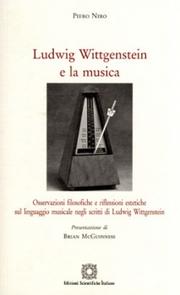
Ludwig Wittgenstein e la musica
By Piero Niro
Subjects: Aesthetics of music, Musical language, Ludwig Wittgenstein, Music, Contemporary philosophy, Western philosophy, Philosophy
Description: Excerpt from Foreword by Brian McGuinness: In his interesting discussion of these and related topics, Piero Niro points out that Wittgenstein’s conservatism as regards music sits ill with his ideas about creative freedom as regards language-rules. His thought (but not his taste) corresponds with the doctrines and practice of Schönberg. He seems to have been content with the liberties taken in music in the past, but not with the culture of his own time. It would go hard with many of us if we had to practise everywhere what we preach. Still there is a general divergence between his 19th century attitudes and the modernism of his own work: the Tractatus fitted well into the wave of new thinking that struck England after the First War. His philosophy, while it sometimes professed to leave everything as it was, didn't leave philosophy as it was. I think this is one of the binds that he got into. He had to say a lot about logic and mathematics to show how little they said, not to mention the unsayability of ethics and mysticism. In mathematics it seems as if he didn't want to go beyond the mathematics needed for his engineering (again something from the 19th century): perhaps the rest didn't interest him. He would be unmoved by Dieudonné's argument that the methods used to get as far as he went entitled one to go further. One can almost hear him saying, But you don't have to. Perhaps there is more to be learnt from the example – if such a world may be called an “example” -- of music Isn't all good music a stretching of or going beyond what was done in the past? As Wittgenstein says, you can't imagine Mozart going on churning out the same sort of stuff indefinitely. Charles Rosen in his critical writings points out that historically Beethoven and others produced works unintelligible for their time-- too many notes, Mr Mozart, the Emperor said, didn't he? Not to mention Wagner. The difference of modern music is a complicated question and more a matter of degree and our distance from it than its fans allow. There is some parallel in art, see Gombrich both on all art being negation of what's gone before and on the special nature of the modern or contemporary art. Not but what the Tractatus does seem stylistically like a modern work, “modern” precisely in the sense we apply to the 1920s. It led Broad to talk about “the highly syncopated pipings of Herr Wittgenstein's flute”. But whatever the style, the content was the negation of much that modernity held dear. One almost feels that the musicians who have got most from him are post-modern, though I have always disliked that term. A final footnote to this theme is this: Wittgenstein's house was "modern" too. Perhaps his “Philosohical Investigations” was post-modern. To my own mind the most important lesson to be learnt from Piero Niro’s book is the success with which (as he shows) Wittgenstein establishes within each area, each world as I have hinted above, a discourse appropriate to it, which guarantees its own sense and nonsense (or the equivalent). There is no single rule, no model in mathematics or natural science, that has to be followed. Above all no theory. But that there is none is not a theory either –it has to be seen from case to case.
Comments
You must log in to leave comments.